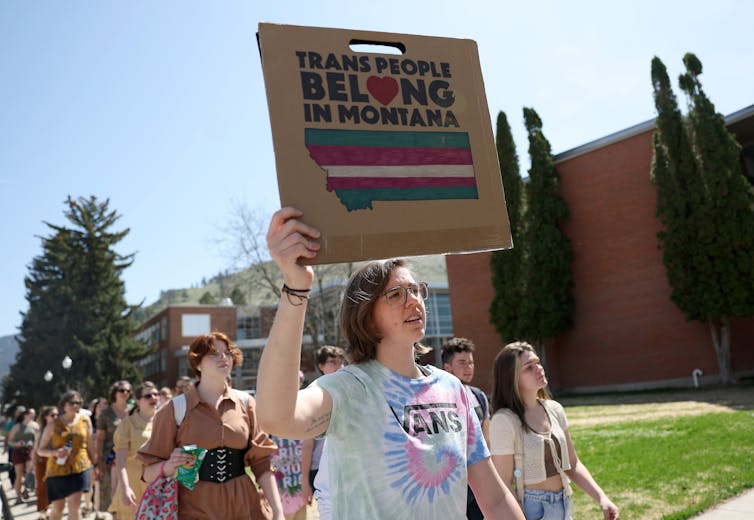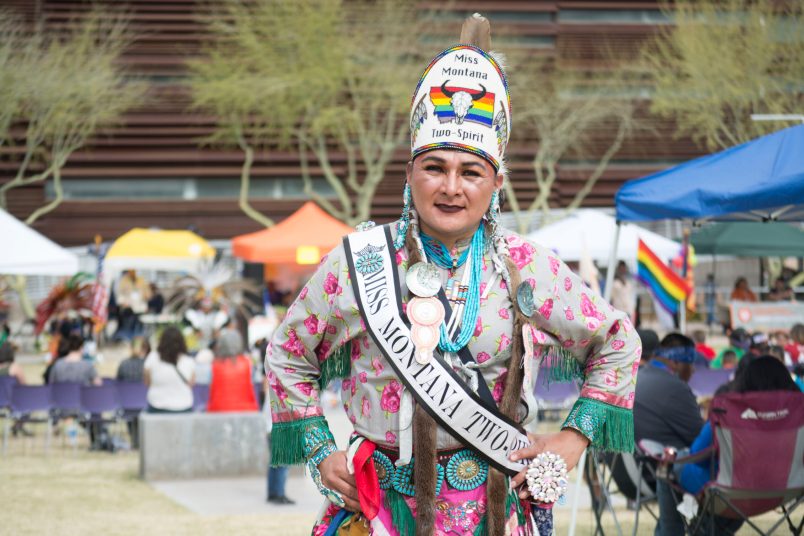This article is part of TPM Cafe, TPM’s home for opinion and news analysis. It was originally published at The Conversation.
Montana’s Republican Gov. Greg Gianforte became the latest to sign several new anti-transgender laws, including one that will prevent gender-affirming medical care for minors.
One thing these new laws do not take into account is that the 12 federally recognized tribes in Montana have historically recognized multiple gender identities, including transgender identities. Most Indigenous peoples recognize multiple gender identities that are believed to be the result of supernatural intervention.
In this regard, Montana state Rep. Donavon Hawk, a Democrat from Butte who is Crow and Lakota, said, “It surprises me that this country is only a couple hundred years old, and we are not able to function with LGBTQ people in our communities.” Indigenous communities have incorporated LGBTQ+ peoples within their societies for centuries.
As an Indigenous scholar who studies the history and religion of Indigenous peoples, I am troubled by how these new anti-transgender laws might affect religious expression and the rights of Indigenous communities, not just in Montana but across the nation.
Indigenous ideas about gender
Indigenous peoples have been in North America for at least 30,000 years. As their societies developed over time, hundreds of different ethnicities, languages, religious practices, gender expressions and identities emerged.
Transgender individuals, an umbrella term for individuals whose gender identity is not linked to the sex they were assigned at birth, have existed throughout history, including within Indigenous communities.
I learned from my maternal grandparents about Blackfeet religion and history. The Blackfeet acknowledged and accepted individual gender expression and identity because it was granted by the divine. Personal gender identity was rarely questioned, because it was tantamount to questioning the divine.
I first learned about Blackfeet ideas about transgender individuals as a young person from hearing oral history stories about famous Blackfeet religious leaders, warriors and adventurers who were transgender. They were viewed as having a direct connection to the divine. People often sought out these individuals for blessings, prayer or spiritual guidance.
Indeed, anthropologists and historians have studied Blackfeet gender expression and learned that the Blackfeet recognized multiple gender identities, including what is defined today in Western societies as transgender.
Two-Spirit and the divine
The modern-day term that many Indigenous peoples in North America have begun to use as an umbrella term to describe the multiple gender identities within Indigenous communities is Two-Spirit. That includes transgender people.
In many Indigenous communities, as the Indian Health Service notes, Two-Spirit identity is believed to come from the divine in visions or dreams and Two-Spirit people often “filled special religious roles as healers, shamans and ceremonial leaders.” https://www.youtube.com/embed/UO29QQm1-zM?wmode=transparent&start=0 A film on Kapaemahu, dual male and female spirit.
Even though the term Two-Spirit does not encompass the wide variety of gender identities across Indigenous communities, many people embrace its use as a way to revitalize Indigenous traditions.
Sadly, transphobia does exist within contemporary Native American communities. And anti-transgender violence is part of the life experience of Two-Spirit people. Some scholars argue this is because of the long history of colonialism and cultural genocide that forced the Western-defined gender binary and patriarchy on Indigenous communities.
The laws might hurt Indigenous rights
Montana’s recent legislative session passed several anti-transgender laws, including one that allows health care providers to refuse patients based on conscience, prohibits drag story hours and defines biological sex as only male or female, in addition to preventing gender-affirming medical care for minors.
Worried about how this last law will affect Montana’s children, the Montana Chapter of the American Academy of Pediatrics stated that “taking away this care will, without a doubt, harm kids.”
Montana is not alone in its efforts to introduce and pass anti-transgender legislation. The nationwide civil rights group Human Rights Campaign states that in 2023 alone, more than 450 anti-LGBTQ+ bills have been introduced in state legislatures.

Investigative journalist Nora Mabie wrote in an article in May 2023 that Indigenous peoples and Native American tribes were being left out of this decision-making process as a result of racism, discrimination and partisanship in the Montana Legislature.
By ignoring the long Indigenous histories of integrating multiple gender identities consecrated by the divine, legislatures are bound to cause both individual suffering and the diminishing of Indigenous peoples’ rights to practice their own religions.
This article is republished from The Conversation under a Creative Commons license. Read the original article.







First.
How about a lawsuit against MT that poses religious freedom vs. these ridiculous anti-trans laws? Let SCOTUS lose their shit over the issues.
One down
"Nothing unites like fear and hate."
Great podcast called Amicus, hosted by Dahlia Lithwick, half of which is usually behind a paywall, has no paywall for the month of June. Today’s podcast starts out with an in depth discussion of the anti-trans legal movement with Chase Strangio, a deputy director of the ACLU’s LGBT project. The second half is a discussion about what can be legitimately done about the runaway Supreme Court.
Apparently something like 44 states have anti-trans laws passed and or pending in 2023. However bad you may think it is, it is always much worse.
I’m of the opinion that fear and hate “appear” to unite, as those succumbing to that dynamic, when left to themselves, commence to chewing without mercy on one another. Love in all its forms; e.g. friendship, courtesy, respect, agape, has for millenia been humanity’s true, dependable uniter.